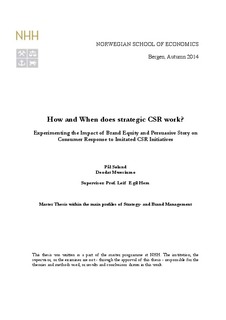How and When does strategic CSR work? : Experimenting the Impact of Brand Equity and Persuasive Story on Consumer Response to Imitated CSR Initiatives
Abstract
TOMS is a shoe company that gives away a pair for each pair you buy. In light of their
success, the imitator BOBS entered offering similar shoe design and the same buy one give
one initiative. Corporate Social responsibility (CSR), by its definition, is a noble cause that
benefits society, thus, one would expect consumers' response to BOBS would be equally
favorable as they didi to TOMS. However, this was not the case (Jørgensen & Pedersen,
2013). Intrigued by the story of TOMS vs BOBS we arrived to the following decision
problem: How can companies that imitate CSR initiatives alleviate unfavorable response
from consumers? In order to operationalize this research question, two specific questions
were investigated: (1) Can brand equity alleviate consumers' unfavorable response to imitated
CSR initiatives, and (2) Can a persuasive story alleviate consumers' unfavorable response to
imitated CSR initiative? These questions were addressed with a 2x2 factorial design
experiment where the dimensions were known brand/unknown brand and persuasive story/
no persuasive story. The persuasive story yielded significant main effects on product attitude
and purchase intentions. However, simple effects analysis revealed that it was persuasive
story alongside the known brand that provided the significant results. The implication for
managers is that persuasive story with a strong brand can jointly bring forth more favorably
consumer response to imitated CSR-products. Interestingly, the present study found
significant correlation between perceived sincerity of the company and perceived fit
(between CSR initiative and the company), recognizing that this correlation may not
necessarily mean causation, future studies may consider investigation of the causal analysis
between the two variables.
